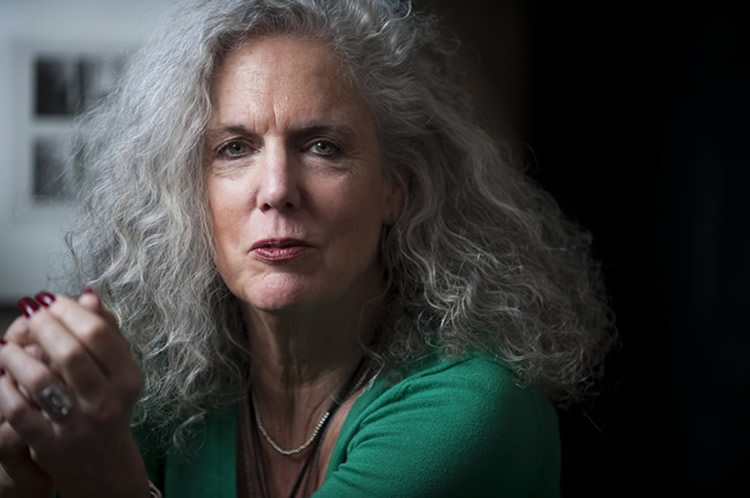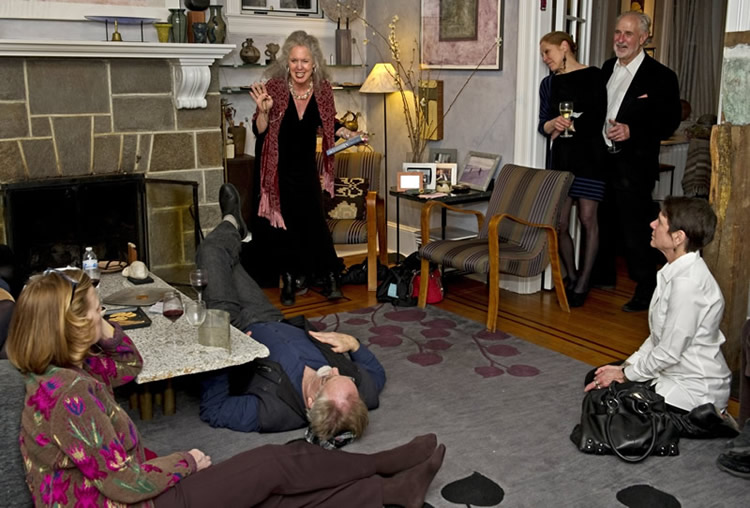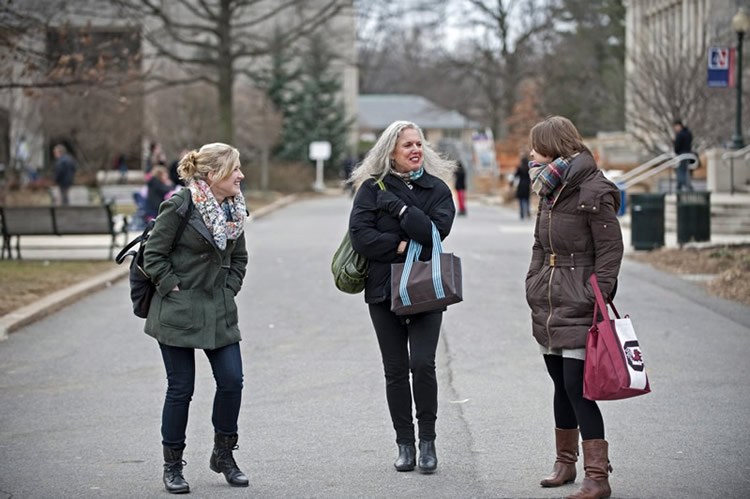
'Sex After...' author Iris Krasnow: 'Never TMI for me'
By Lisa Lednicer
April 4, 2014

Iris Krasnow at home. (Mary F. Calvert / For The Washington Post)
Inside an elegant house in Northwest Washington, a slender woman wearing multiple bracelets, dangly silver earrings and a black V-neck shirt is talking about sex. Her hair, a cotton-candy puff of gray, is gently pulled back, and her eyes droop a bit at the corners. Iris Krasnow is 59, but the wrinkles on her face look more like delicate paintbrush strokes than deep ruts.
The 42 people surrounding her are perched on couches and leaning against doorjambs, listening to Krasnow read from her sixthand latest book, “Sex After … Women Share How Intimacy Changes as Life Changes.” It’s filled with interviews of 150 women talking about sex after marriage. Sex after childbirth. Sex after cheating. Sex after divorce.
Sex after menopause, surgery, widowhood. Sex after years of wanting it and not getting it.
Krasnow launches into a story about the 70-something woman she met during a previous book tour: “She had orange hair, an orange pantsuit, orange lipstick, and she said, ‘Oh, honey, if you wanna hear about passion, call me.’ I went to her house, and she was wearing a peignoir, white feathers around the neck, and she said, ‘Oh, honey, you’re early. My husband and I are gonna take a hot tub and smoke a little pot. You wanna join us?’ ”
Krasnow pauses. Laughter fills the room.
“And they had just returned from a tantric sex workshop.”
Women in their late 80s to early 90s are the fastest-growing segment of the aging population, according to “Sex After... .” That means a college-aged woman who stays healthy will have a sex life that lasts seven decades. Krasnow’s new book includes interviews with research scientists, a rabbi, Ruth Westheimer (of course) and a placenta encapsulation specialist (don’t ask).
There are anecdotes from Krasnow's life as a writer and the mother of four grown boys who lives in a house that her husband, an architect, designed in Annapolis. The book even mentions a doctor trying to grow human penises for reattachment from the cells of soldiers with genital wounds. What's missing are details of Krasnow's own sex life, although she does mention her husband, Chuck Anthony, in her other books about intimacy and relationships. (He says: "When she told me the subject of the book, I said, 'I'm not in this one.' I don't need our sex life broadcast over all Creation.")
The most compelling parts involve women dishing about sex. Early reviews have dwelled on the stories about elderly women and their sexual partners (“What Hot Grannies Can Teach Newlyweds About Sex,” Krasnow wrote in a Huffington Post column), but Krasnow also explores the hookup culture of 20-somethings and the frustration of middle-aged women whose unemployed husbands have become immobile and unattractive.
Each story evokes the feeling that you're sitting with Krasnow in her enormous kitchen, surrounded by a jumble of Buddha figurines and her kids' drawings, listening as random strangers pour out their deepest secrets. Her soothing, slightly croaky voice has drawn confidences from people she has met on airplanes and at book signings, and while clubbing in London with 20-somethings. With her colorful scarves and necklaces, Krasnow comes across as a hip aunt who spent her youth in Oregon and backpacked across Europe, the relative you can tell anything to and know it won't get back to Mom and Dad.
“I’m the go-to girl of ‘Oh, my God, you can’t believe what I’m going through,’ ” Krasnow says. “When people say, ‘That’s TMI,’ it’s never TMI for me.”
Like Gail Sheehy and Erica Jong, Krasnow has made a career of chronicling what she calls the female growth cycle: women as serial daters in their 20s; wives and mothers in their 30s and 40s; caregivers in their 50s; and now as empty-nesters in their 60s and beyond.
It is possible to traverse the entire angst-ridden baby boomer era by reading Krasnow’s books in order of publication. In “Surrendering to Motherhood,” Krasnow charts her journey from ambitious journalist who traveled the world to the mom who found inner peace with the birth of her children. “Surrendering to Marriage,” a New York Times bestseller, celebrated the ordinariness of marriage. “Surrendering to Yourself” urged women to “plug into the passion of our souls.” In “I Am My Mother’s Daughter,” she dissects the relationships graying women have with their aging mothers. “The Secret Lives of Wives” introduces readers to swingers, adulterers, women in arranged marriages and others struggling with what Krasnow calls the “midlife malaise” of wedlock.

Krasnow at a book signing. (Mary F. Calvert / For the Washington Post)
Krasnow was raised in Oak Park, Ill. Her father founded an office furniture company; her mother fled Warsaw during the German occupation and lost her family to the Holocaust. Later in life, she ran the menswear department at Lord & Taylor in Chicago and sold clothes to a young Michael Jordan.
"I grew up with a mother, who, although she missed the past, she was always so embracing of the now," Krasnow says. "She'd say, 'Well, look what I have — it could always be worse.' I grew up hopeful."
Krasnow was a cheerleader in high school and graduated from Stanford University; in her books she lovingly outlines how she evolved into a California girl, dabbling in est and Buddhism. After graduation she moved back to Chicago and worked in a high-profile PR agency. She decided journalism was her true calling, spent a few years as a fashion writer in Dallas, then ended up in the D.C. bureau of United Press International, hopping around the globe in silk blouses and cowboy boots and interviewing Yoko Ono, Queen Noor and Mr. Rogers.
But motherhood tugged at her. She and her husband had agreed to have "four by 40," and that's what happened: two boys, then twin boys at 39. She had left UPI and was studying for her master's in liberal studies at Georgetown University when she submitted an essay to The Post that began, "Whose life is this, anyway?"
She talked about how she had spent her 20s and 30s putting her career first and now she wanted to stay home with her kids. The essay sparked dozens of letters and a book deal from Miramax Books, followed by appearances on “The Oprah Winfrey Show” and, much later, an essay in “Mommy Wars,” by Leslie Morgan Steiner. The letters Krasnow received after “Surrendering to Motherhood” focused on marriage, so that led her to write “Surrendering to Marriage,” and so on. She’s a hit with Jewish women’s groups and book clubs.
Krasnow's work resonates with readers, says her research assistant Nicole Glass, because "she gets to people going through hard times who pick up her books and discover themselves."
Krasnow does most of her writing in her bedroom overlooking the Severn River. Her shingle-style house is filled with piles of magazines and books studded with Post-it notes. Family photos are everywhere. Her then-baby boy Jackson is on the cover of her first book. Motherhood is everything to her; she has said in interviews that she "surrendered to motherhood" when she was feeding scrambled eggs to the boys and the eggs ended up in her hair and she realized she was blissfully happy.
"She was a supermom, honestly," says Jackson, now a freshman at American University. "She was so loving. She always made sure we had consistency, sat down at the same time for dinner."
For the past few years, Krasnow, a journalism professor at American, has taught a class called "Voices of Women." Participants keep journals, read book excerpts and swap stories about their lives. The class meets weekly for six weeks. In the current group, one woman is digging out from a disastrous home-renovation project; another is caring for an elderly father who doesn't always recognize her. It's a noncredit course, and the vibe is more California than D.C.
During a recent session, someone mentions a bad review “Sex After …” received in the New York Times, and everyone rushes to comfort Krasnow. They’re worried she’ll be crushed, but she waves away their concern: “Thanks, all of you, for your loving support,” she enthuses. “Think about these movie stars, when their whole life and esteem rests on a review. You want some equilibrium in your life.”

On the campus of American University with journalism graduate students Kara Ferguson, left, and Marie Lowenstein. (Mary F. Calvert / For The Washington Post)
Krasnow’s next book won’t be about marriage or self-actualization or sex. She’s not interested in leading sex workshops; she wants, as she puts it, “to go in a whole different direction.” She plans to write a historical novel inspired by a black-and-white photo she has of her mother atop a motorcycle in Poland. The photo was taken one month before Hitler annexed the country. Krasnow plans to interview and research as vigorously as she has with her previous books, but the details will be all hers. She's not sure yet about the story she wants to tell, but it'll be about people in prewar Europe who had jobs, families and houses, and what happens when that all gets wiped out. It'll be about the connections that bind, and how quickly they can be cut. It'll be about relationships.
Lisa Grace Lednicer is a writer living in Arlington.
